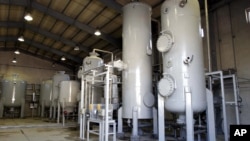Iran's official stock of enriched uranium has fallen by half after large amounts stuck in pipes have been recategorized as unrecoverable under a process agreed with major powers, the U.N. atomic watchdog said on Friday.
But before that process began last month, Iran came close to reaching a limit on its uranium stock, one of the most sensitive aspects of Tehran's nuclear deal, a confidential report by the International Atomic Energy Agency (IAEA) obtained by Reuters made clear.
The agreement that the United States, Britain, France, Germany, China and Russia reached with Iran in 2015 restricts Iran's nuclear activities in exchange for the lifting of international sanctions against the Islamic Republic.
“As of 18 February 2017, the quantity of Iran's uranium enriched up to 3.67 percent U-235 was 101.7 kg,” the International Atomic Energy Agency (IAEA) said in a quarterly report on Iran, its first since the inauguration of U.S. President Donald Trump, a vocal critic of the deal.
Material unrecoverable
That was about half the limit of 202.8 kg, but only after 100 kg of material at one plant alone was deemed unrecoverable and not included in the calculation.
The deal also caps the concentration of the highly fissile U-235 isotope to which Iran can enrich uranium at 3.67 percent, far below the roughly 90 percent of weapons-grade uranium.
The major powers and Iran published agreements in December and January specifying types of uranium that would be considered unrecoverable and therefore not considered part of its stock of low-enriched uranium.
‘Downblending’
One of those agreements defined a process by which Iran would flush out low-enriched uranium (LEU) from pipes and other equipment at a plant in Isfahan and “downblend” it to the level of natural uranium.
That process started on Jan. 31, the report said, at which point 99.9 kg of LEU was excluded from the total stock. Friday's report was the first to specify the size of the stock, since the papers published clarified what should be excluded. Previous reports had said only that it was within the limit.
Heavy water stock within limit
Iran's stock of heavy water — a moderator used in a type of nuclear reactor that can produce plutonium — was within a 130-ton limit at 124.2 tons, but that did not include 11 tons that Iran has shipped to Oman.
The Obama administration criticized Tehran after it went over the limit on heavy water for the second time last year, adding that the deal specifies that excess heavy water must be delivered to a foreign buyer.
Iran shipped 11 tons to Oman with a view to selling it later, which defused the standoff. But it continues to produce heavy water and the issue could yet attract the attention of Trump, who has said he wants to “police that contract so tough [the Iranians] don't have a chance.”





